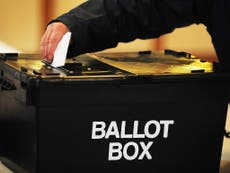Brexit uncertainty is dragging the UK economy down and people's wages with it, says Mark Carney
The Bank of England Governor said the economy is slowing because households and businesses are not spending as much
Brexit and the uncertainty around it has already hit people’s incomes and is weighing down the economy, the Governor of the Bank of England has said.
Mark Carney said the Bank is helpless to prevent the “weaker real incomes” accompanying Britain’s withdrawal from the European Union.
He also said that households had cut back on spending and businesses on investment, slowing the economy’s growth.
It comes as the Bank downgraded its forecasts for the British economy this year, just days after EU statistics indicated the eurozone is growing at twice the rate of the British economy. The Bank's Monetary Policy Committee also voted to keep interest rates at record low.
Mr Carney said: “The UK economy is beginning the process of adjusting to a new and as of yet uncertain economic relationship with the European Union.
“Monetary policy cannot prevent the weaker real incomes likely to accompany the move to new trading arrangements with the EU.
“But it can influence how this hit to incomes is distributed between job losses and price rises, and it can support UK households and businesses as they adjust to such profound change.”
Mr Carney has previously clashed with Theresa May over monetary policy, and his words on Thursday came amid cabinet divisions over the UK’s approach to Brexit.
In particular, there has been on-going uncertainty over the Government’s preferred approach to what kind of transitional arrangements there will be between leaving the EU in March 2019 and beginning a new trading relationship with the bloc.
The Governor went on: “Financial markets particularly sterling marked down the UK’s relative prospects quickly and sharply.
“Households looked through Brexit related uncertainties initially, but more recently as the consequences of sterling’s fall have shown up in the shops and squeezed their real incomes they have cut back on sending, slowing the economy.
“Businesses have been somewhere in between, but since the referendum they have invested much less aggressively than usual in response to an otherwise very favourable environment.”
He added: “In the MPC forecast, uncertainty about the eventual shape of the UK’s economic relationship with the EU weighs in the decision of businesses and households and pulls down both demand and supply.”
The Bank confirmed that it now expects the economy to grow by 1.7 per cent this year, down from a previous forecast of 1.9 per cent.
Meanwhile, growth is now tipped to slow to 1.6 per cent in 2018, down from a previous forecast of 1.7 per cent.
Eurostat’s “flash” estimate showed on Tuesday that the eurozone’s GDP grew at twice the rate of the UK’s in the second quarter of 2017.
Growth in the 19-member single currency bloc was 0.6 per cent, double the 0.3 per cent estimate for the UK from the Office for National Statistics last week.
Subscribe to Independent Premium to bookmark this article
Want to bookmark your favourite articles and stories to read or reference later? Start your Independent Premium subscription today.








Join our commenting forum
Join thought-provoking conversations, follow other Independent readers and see their replies
Comments